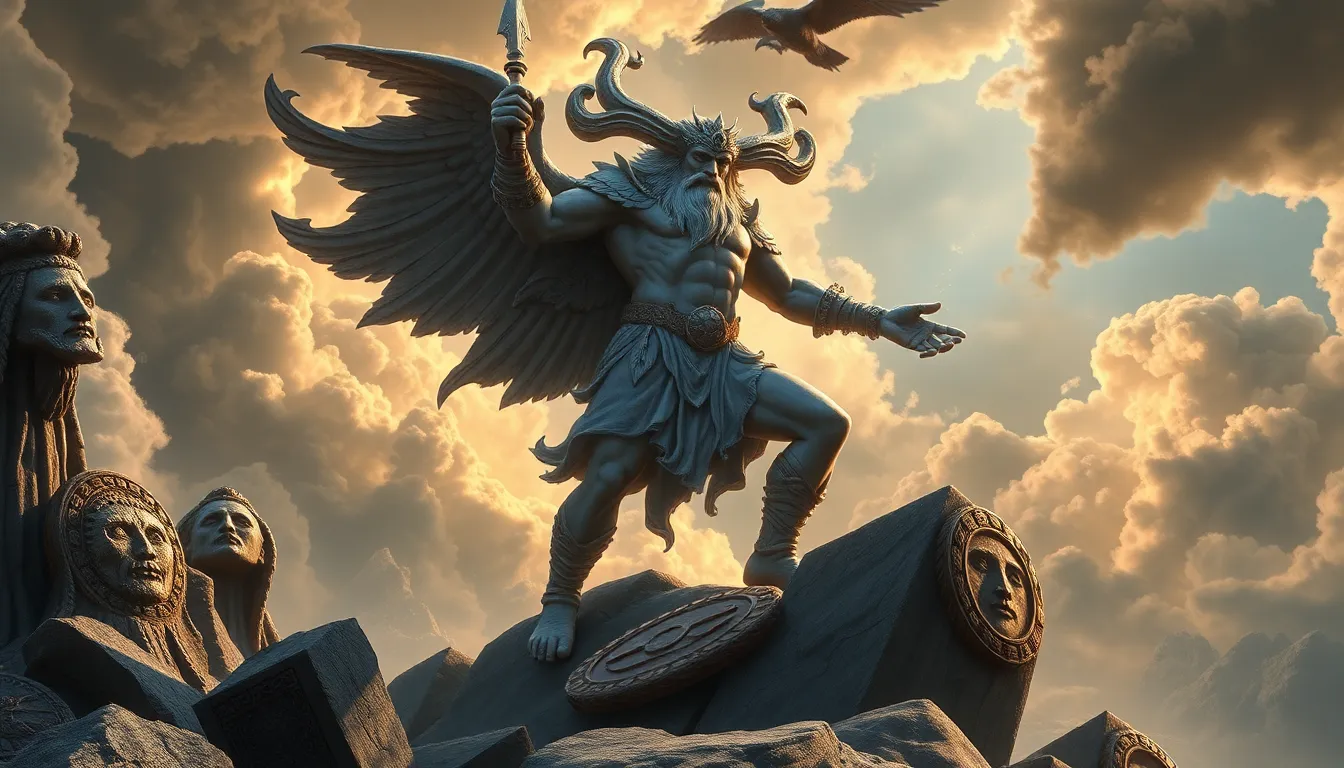Cronus: The Titan Who Challenged the Gods of Fate
I. Introduction
Cronus, a central figure in Greek mythology, is known as the Titan who defied the very fabric of fate. As the leader of the Titans, he held a significant place in the mythological hierarchy, standing in opposition to the Olympian gods. This article delves into the complex narrative of Cronus, exploring his rise to power, his fear of prophecy, and his ultimate downfall at the hands of his own children.
II. The Origins of Cronus
Cronus was born to Gaia (the Earth) and Uranus (the Sky), making him one of the primordial Titans. In the context of Titan mythology, Cronus is pivotal as he represents the transition from the primordial beings to the more anthropomorphized gods that would follow.
As the youngest Titan, Cronus possessed immense strength and cunning. His lineage is crucial to understanding the generational conflict that characterizes Greek mythology. Cronus’s relationship with his parents, particularly his mother Gaia, was complex; she loved him but also provided him with the means to challenge his father, Uranus.
III. The Rise of Cronus
Cronus’s rise to power is marked by a dramatic rebellion against his father, Uranus. Discontent with Uranus’s oppressive rule, Cronus, encouraged by Gaia, castrated Uranus with a sickle, leading to the overthrow of the primordial god. This act not only established Cronus as the new ruler of the Titans but also marked a significant shift in the power dynamics of the cosmos.
Following his victory, Cronus ruled during a golden age, often referred to as the “Golden Age of Cronus.” During this time, there was peace and prosperity. However, the seeds of his downfall were sown in the very nature of his rule, as a prophecy foretold that one of his children would eventually overthrow him.
IV. The Fear of Prophecy
The prophecy regarding Cronus’s downfall instilled a deep fear in him. To prevent this fate, Cronus resorted to extreme measures: he began to swallow each of his children at birth. This grim act stemmed from his desire to maintain his power and avoid being overthrown.
The psychological implications of Cronus’s fear are profound. Rather than embracing the potential of his children, Cronus’s paranoia drove him to commit atrocities against his own family. This highlights a recurring theme in mythology—how fear of fate can lead to actions that ultimately fulfill that very fate.
V. The Role of Rhea
Rhea, the sister and wife of Cronus, played a crucial role in the narrative of Cronus’s tyranny. Disillusioned by Cronus’s violent actions, Rhea devised a cunning plan to save their youngest child, Zeus. When Zeus was born, Rhea secretly hid him in a cave on the island of Crete and presented Cronus with a stone wrapped in swaddling clothes, which he swallowed, believing it to be his son.
This act of defiance against Cronus marked a turning point in the myth. Rhea’s strategic thinking and courage set the stage for Zeus’s eventual rise and the overthrow of Cronus.
VI. The Titanomachy: Cronus vs. Zeus
The Titanomachy, the epic battle between the Titans led by Cronus and the Olympians led by Zeus, is one of the most significant events in Greek mythology. It symbolizes the struggle between old and new, chaos and order.
Zeus, having grown to manhood in secrecy, rallied his siblings—Hestia, Hera, Demeter, Poseidon, and Hades—and formed alliances with other powerful entities, including the Cyclopes and the Hecatoncheires. These alliances proved pivotal in the conflict.
- Key Battles: The battles were fierce, with both sides exhibiting immense power.
- Zeus’s Strategy: Utilizing thunderbolts crafted by the Cyclopes, Zeus led the charge against Cronus and the Titans.
- Outcome: Ultimately, the Olympians emerged victorious, leading to the imprisonment of the Titans in Tartarus.
VII. The Aftermath of Cronus’s Fall
The defeat of Cronus had far-reaching consequences for the Titans. With their leader overthrown, the Titans were cast into the abyss of Tartarus, a dark and dreadful place reserved for the most powerful of beings. However, Cronus’s fate varies in different narratives; some stories suggest he was later freed or ruled over the Elysian Fields.
Cronus’s legacy in mythology is complex. He is often seen as a symbol of the cyclical nature of power, fear, and destiny. His story has inspired countless interpretations in art and literature, reflecting the eternal struggle between generations.
VIII. Conclusion
In reflection, Cronus embodies the themes of power, fear, and destiny that permeate Greek mythology. His story serves as a poignant reminder of the consequences of challenging fate and the inevitable nature of change.
The enduring impact of Cronus’s tale can be seen across various cultural and literary contexts, illustrating the timeless allure of mythology. Ultimately, Cronus’s defiance against fate highlights a universal truth: the struggle against destiny can lead to both greatness and ruin.




